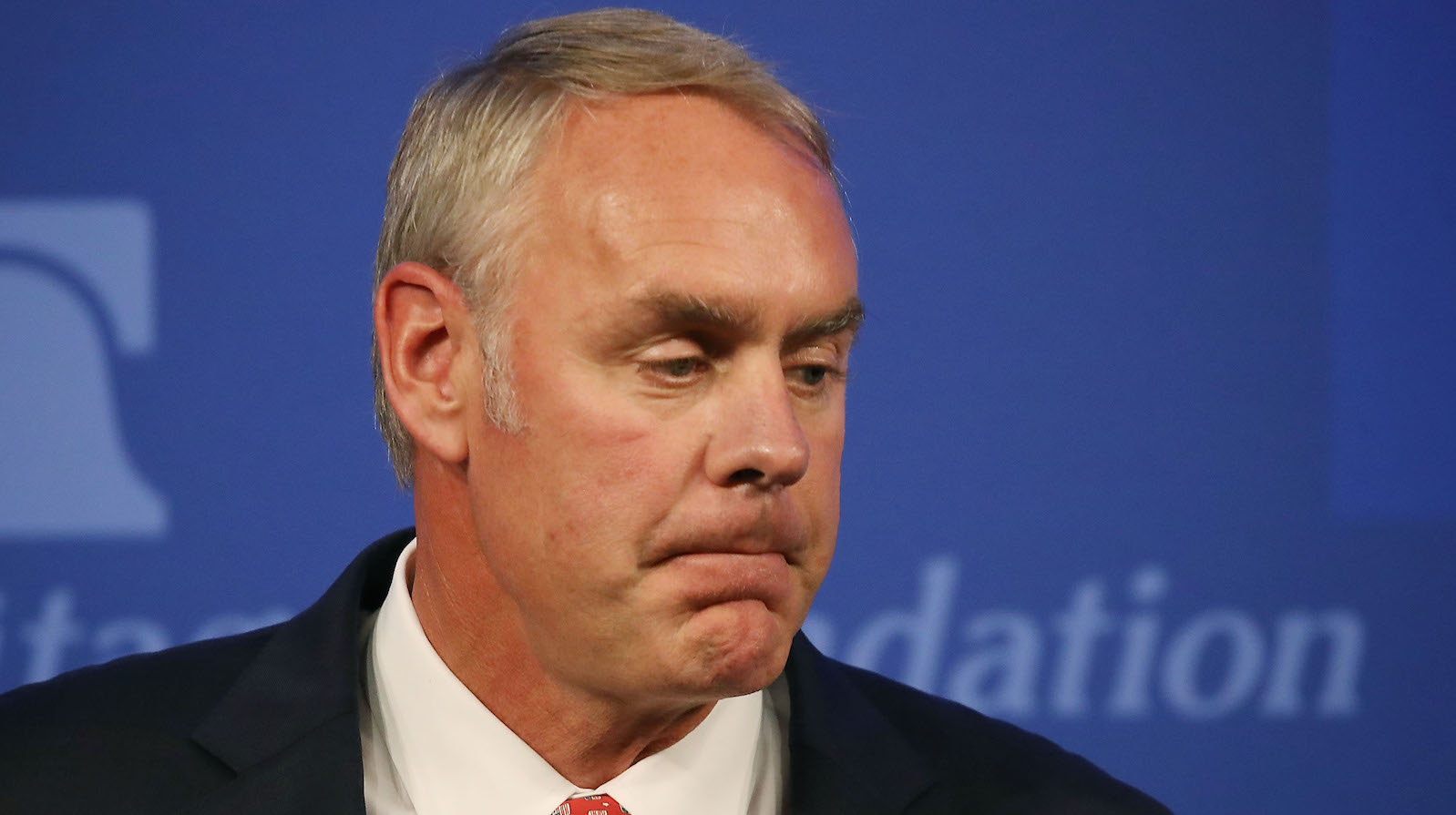This story was originally published by Huffington Post and is reproduced here as part of the Climate Desk collaboration.
For several months, Interior Secretary Ryan Zinke managed to fly under the radar, as Democrats and environmental groups focused their attention on the steady drip of ethical lapses coming from EPA Administrator Scott Pruitt. With Pruitt now gone, Zinke appears to have taken the reins as the most scandal-plagued member of President Donald Trump’s Cabinet.
Since being sworn in in March 2017,the former Montana congressman and Navy SEAL has proven himself a loyal soldier of Trump’s deregulatory agenda, working to scrap environmental safeguards and boost mining and fossil fuel production. But much like Pruitt, Zinke has been unable to steer clear of negative headlines. He has faced at least 11 formal investigations — many of them ongoing — and calls for several others. That’s more than the last four interior secretaries combined, according to an analysis by Colorado-based conservation group Center for Western Priorities.
Aaron Weiss, media director at CWP, told the Huffington Post that Pruitt was “the best thing Ryan Zinke had going for him.”
“Between his shady business deals and clear abuse of office, Secretary Zinke could soon find himself spending more time responding to investigators than doing his job,” Weiss said via email.
Here’s a short, incomplete list of issues that have many questioning whether Zinke is cut out to serve as the chief steward of America’s natural resources.
1. His ties to a Montana real estate deal.
At the center of Zinke’s current ethical troubles is a development project in his hometown of Whitefish, Montana. According to a Politico investigation, the project involves a foundation Zinke started and was president of before resigning to take over the Interior Department, and is backed by Halliburton Chair David Lesar. Zinke and his wife could stand to benefit financially if the deal goes through. House Democrats later revealed that Zinke met with the project’s developers in his government office last summer, and they called on the Interior Department’s internal watchdog to investigate whether Zinke violated ethics rules by using taxpayer resources for personal financial gain. Interior’s Office of Inspector General launched a full investigation on July 16.
Representative Don Beyer, Democrat of Virginia, skewered Zinke in a series of posts to Twitter on Thursday, comparing him to the ousted EPA chief.
“Pruitt was not the only Trump Cabinet member with terrible ethics problems, and Zinke’s issues also stem from ignoring ethics guidelines while empowering industry,” Beyer wrote.
2. “Make America Great Again” socks.
During a meeting of the Western Governors Association last month, Zinke tweeted a photo of himself wearing socks that featured Trump’s face and his campaign slogan “Make America Great Again.” He later deleted the photo and apologized after several groups pointed out that he likely violated the Hatch Act, which prohibits federal employees from using their government positions to engage in political activity. The U.S. Office of Special Counsel launched an investigation into the matter earlier this month.
3. Keeping the public in the dark about personal meetings.
CNN reported Thursday that it had uncovered several instances where Zinke’s official calendar excluded information about whom he met with or what was discussed. An Interior spokesperson told the network that the secretary’s team “always strive[s] towards transparency,” despite having not distributed Zinke’s upcoming schedule in nearly a year. Representative Raúl Grijalva, Democrat of Arizona, the ranking member of the House Natural Resources Committee, told CNN he plans to request another investigation.
4. Flying in style.
Like other top administration officials, Zinke has come under fire for his use of private charter planes and government helicopters, including a $6,250 round-trip helicopter flight to meet Vice President Mike Pence for an afternoon horseback ride. The inspector general investigated Zinke’s use of private planes at taxpayers’ expense — a controversy Zinke dismissed as “a little BS” — and concluded that he “generally followed relevant law, policy, rules, and regulations.” However, it found that one trip — a $12,375 chartered flight from Las Vegas to Montana aboard an oil company plane — was approved by ethics officials “without complete information” and could have been avoided.
5. Exempting Florida from offshore drilling plan.
Days after the Trump administration released a sweeping new proposal to open nearly all U.S. waters to offshore drilling, Zinke traveled to Florida and announced that on the recommendation of Governor Rick Scott — a staunch Trump supporter — he was removing the state’s coastal waters from consideration. Zinke said Florida is “unique and its coasts are heavily reliant on tourism as an economic driver.”
Democrats immediately speculated that the move was a political stunt to help get Scott elected to the Senate. CNN reported in April that the Office of Special Counsel is reviewing whether the announcement violates the Hatch Act. Zinke walked back his initial statement following demands from other states that they receive the same exemption.
After talking with @FLGovScott, I am removing #Florida from the draft offshore plan. pic.twitter.com/lZIfdCDNOR
— Secretary Ryan Zinke (@SecretaryZinke) January 9, 2018
6. His apparent effort to bully Senator Lisa Murkowski.
Last year, Zinke phoned Alaska Republican Senators Lisa Murkowski and Dan Sullivan after Murkowski delivered a key vote to block the repeal of the Affordable Care Act. Sullivan told the Anchorage Daily News that Zinke delivered a “troubling message,” indicating that Murkowski’s defection could jeopardize future energy projects in Alaska. A probe by Interior’s inspector general was effectively shut down after the Alaska senators refused to be interviewed. And Interior ultimately thwarted a subsequent investigation by the Government Accountability Office by taking six months to respond, only to refuse to give the watchdog details about Zinke’s phone call.
7. He failed to disclose shares in a Montana gun company.
As the Huffington Post first reported in January, Zinke failed to report that he was still a shareholder in PROOF Research, a Montana company that manufactures and sells firearms. In addition to the undisclosed financial interest, Zinke’s calendar shows he met with executives and a lobbyist for the company — a move ethics experts said may have been a conflict of interest. In February, the Campaign Legal Center, a Washington, D.C.-based government ethics watchdog, announced that it had asked Interior’s inspector general to open an investigation.
8. Staff shake-up that critics charge was politically motivated.
In June of last year, Interior reassigned dozens of senior staff, many to roles for which they had no experience — a move that an agency spokesperson claimed would “better serve the taxpayer and the department’s operations.”
Joel Clement, a federal scientist who blew the whistle on the administration and claimed he was reassigned for warning about the dangers of climate change to Alaska Natives, ultimately resigned. Interior’s internal watchdog looked into the matter, but was ultimately unable to determine if the reassignments violated federal law because of a lack of documentation. It concluded the changes were made “without a written plan or clear criteria,” “without consulting with the departmental leadership,” and “with no documented action plan.”
Talking Points Memo found that the reassignments disproportionately impacted Native Americans. The report came roughly a week after CNN reported Zinke had told Interior employees that workplace diversity was not important.
9. Mixing work with politics.
Zinke has on several occasions met with Republican donors and attended GOP fundraisers during taxpayer-funded trips, drawing accusations that he’s mixing official business with politics. In late March, he visited the U.S. Virgin Islands for the 100th anniversary of the transition of power from Denmark. While there, he flew on chartered planes, at a price of $3,150, and made an appearance at a Republican fundraising event. The Virgin Islands Republican Party later repaid Interior $275 for expenses related to Zinke’s appearance after concerns were raised, as Politico reported.
These activities, along with campaign-style TV advertisement that a dark money group with ties to Pence recently recently ran that praised the Interior Secretary, has added to speculation that Zinke has lofty political aspirations.
10. Halting health impact study of mountaintop mining.
The Interior Department last August halted a study by the National Academies of Sciences into the health effects of mountaintop removal, a mining process that involves blasting to extract coal. The agency’s internal watchdog looked into the matter and concluded in June that Interior officials had little justification for stopping the study.
“Departmental officials decided to halt the study because they did not believe it would produce any new information and felt costs would exceed the benefits,” Mary L. Kendall, Interior’s deputy inspector general, wrote in a letter to Grijalva.




